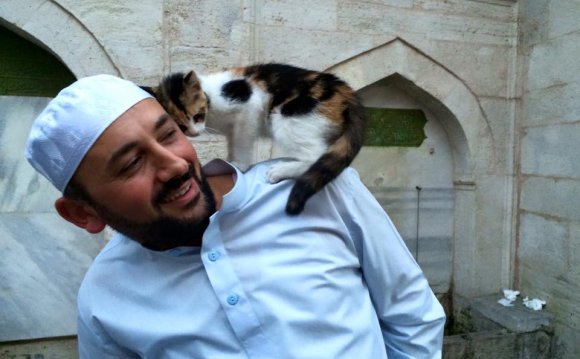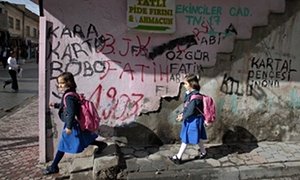
 whenever Itir Erhart, 39, wished to enrol her child in primary school, she unearthed that it was almost impossible to find someplace that did not instruct Sunni Islamic religion and Sunni spiritual techniques.
whenever Itir Erhart, 39, wished to enrol her child in primary school, she unearthed that it was almost impossible to find someplace that did not instruct Sunni Islamic religion and Sunni spiritual techniques.
“We tend to be a non-religious family, ” Erhart stated. “we don’t desire my son or daughter to know about Jesus in school.”
In the end, she had to seek out the exclusive industry for worry that the woman daughter will be marked on since the just non-religious youngster into the course. “Religion is actually therefore dominant in Turkish condition culture that I became afraid my child is entirely marginalised.”
Despite international courts governing that chicken should admire the preferences of pupils, critics state the government regarding the ruling Turkish Justice and developing party (AKP) is seeking to reshape the system along Sunni Islamic outlines. Present federal government moves to convert most secular schools into Imam Hatip spiritual schools features added to the controversy.
In September last year the government granted permission for girls as early as 10 to put on headscarves in class. Programs have now been floated to increase compulsory religion classes to all primary school students.
“The discussion is very mental, ” stated Batuhan Aydagül, director of this Education Reform Initiative, an independent thinktank. “Sadly it distracts from all of the immediate problems concerning education in Turkey, eg drop-out rates, top-notch training or perhaps the inadequate number of school buildings. It obstructs lasting reforms.”
In 2012, the federal government launched a controversial 12-year compulsory training system with four-year levels of main, middle and highschool, known in Turkey as the “4+4+4”, paving the way in which for religious center schools.
Under a plan introduced by the federal government last year, about 40, 000 pupils had been forcibly enrolled in spiritual Imam Hatip schools, Turkish media reported. In a few areas religious vocational schools had been all of a sudden the only real alternative for parents who could not afford to teach kids privately.
“There is absolutely nothing incorrect with providing religious training to a pious element of community, ” stated Kenan Çayir, which teaches sociology at Bilgi University in Istanbul. “nonetheless it becomes problematic if parents and students are suddenly becoming robbed of earning a selection.”
Imam Hatip schools had been first set up to teach imams and preachers following the first step toward the Turkish republic in 1923, in compliance with Turkish republican strictures on secularism, which bought firm state control of all spiritual task. The schools were largely shut down after the postmodern coup in 1997 when the armed forces forced the Islamic Welfare celebration government from energy. Subsequent rules sealed Islamic center schools and made it almost impossible for Imam Hatip pupils to get a place at certainly one of Turkey’s universities.
“Turkey is a predominantly Muslim nation, ” stated Suleyman Agalday, a 1995 Imam Hatip graduate. “It’s not incorrect to teach religious values to our kids.”
Following the AKP stumbled on energy in 2002, the sheer number of pupils going to Imam Hatip schools increased by 90per cent to practically 1 million kiddies elderly between 10 and 18, or 9per cent of all students. Federal government officials, many of them former Imam Hatip students on their own, have since argued that the schools’ revival reacts to demand by Muslim people just who believed discriminated against after 1997.
“The Islamic vast majority however sees itself as a target of Kemalist modernisation, ” stated Tahir Abbas, professor of sociology at Fatih University in Istanbul. “The reopening of those schools is seen as revenge resistant to the secularist elites, an endeavor to rebrand the Turkish country and reinvent the Turkish memory. How Islam is imposed enhances the feeling of growing authoritarianism. It ignores variations and fails to appreciate the pluralism of Turkish Islam. The us government takes Islam from exclusive in to the public sphere and attempts to frame the ‘ideal Muslim citizen’. It’s a very patriarchal, difficult idea.”
Sedat Dogan, an Imam Hatip graduate and activist with all the Anti-Capitalist Muslims team, argued that to target all criticism on vocational religious schools would be to skip the issue entirely.
“Both secular and religious state-controlled schools produce consistent resident prototypes. Individuals should have the knowledge they might need and also the education they need, not the education that condition deems proper to impose in it, ” he said. “We are squeezed between just bad alternatives, involving the state-controlled worship of Jesus and state-controlled worship of Atatürk. Neither part is appropriate.”
Itir Erhart agreed. Immediately after the enrolment of her daughter in a private Istanbul major college she realised your lack of religion did not spell the absence of worship, which the students were meant to swear in front of an Atatürk statue they would “grow to be good Turkish children”.
“once I complained on administration, they certainly were amazed. They said: ‘You don’t appear to be a religious individual, what exactly is the issue?’ They simply failed to recognize that I did not want my youngster becoming confronted with such ideologies. The school director told me they certainly were ‘at war’ with growing Islamisation. One other part states the exact same. What Sort Of kiddies should come away from an education system that teaches them to fight, maybe not understand, the ones that will vary?”
RELATED VIDEO




 Karnıyarık (lit. 'riven belly' in Turkish) is a Turkish dish consisting of eggplant stuffed with a mix of sautéed chopped onions, garlic, black pepper, tomatoes, parsley and ground meat. A related dish is the İmam Bayıldı which does not include meat, and is served cold.
Karnıyarık (lit. 'riven belly' in Turkish) is a Turkish dish consisting of eggplant stuffed with a mix of sautéed chopped onions, garlic, black pepper, tomatoes, parsley and ground meat. A related dish is the İmam Bayıldı which does not include meat, and is served cold.








